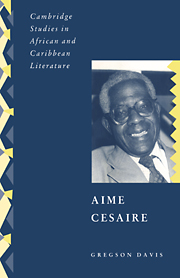Book contents
- Frontmatter
- Contents
- Preface
- Acknowledgements
- Chronology
- Introduction
- 1 From island to metropolis: the making of a poet
- 2 Exploring racial selves: “Journal of a Homecoming”
- 3 Inventing a lyric voice: the forging of “Miracle Weapons”
- 4 Lyric registers: from “Sun Cut Throat” to “Cadaster”
- 5 The turn to poetic drama
- 6 The return to lyric: “me, laminaria …”
- Epilogue
- Notes
- Bibliography
- Index
4 - Lyric registers: from “Sun Cut Throat” to “Cadaster”
Published online by Cambridge University Press: 29 October 2009
- Frontmatter
- Contents
- Preface
- Acknowledgements
- Chronology
- Introduction
- 1 From island to metropolis: the making of a poet
- 2 Exploring racial selves: “Journal of a Homecoming”
- 3 Inventing a lyric voice: the forging of “Miracle Weapons”
- 4 Lyric registers: from “Sun Cut Throat” to “Cadaster”
- 5 The turn to poetic drama
- 6 The return to lyric: “me, laminaria …”
- Epilogue
- Notes
- Bibliography
- Index
Summary
My conception of the universal is of a universal rich with the particular, rich with all particulars, the deepening and coexistence of all particulars.
Aimé CésaireAlthough it was the long prose-poem “Journal of a Homecoming” that inaugurated Césaire's poetic career, its magnitude proved to be unrepresentative of his subsequent lyric production as a whole. If we exclude the lyric dramas, the collection of discrete, relatively short poems of which “Miracle Weapons” was the harbinger has been his preferred genre of publication up to the present. The appearance of these compact volumes of poetry has been intermittent, but it is of capital importance to note that there have been no less than seven to date (the tally includes Cadastre, which is essentially a re-edition and partial revision of previously published poems). The preponderance of short lyric collections in his overall output spanning approximately half a century tells its own tale: it is on these brief, highly polished gems that Césaire the poet has chiefly staked his reputation. In this chapter I hope to illustrate, by means of concrete examples, the poet's increased mastery of his favorite genre in its major registers.
The postwar literary activity of Césaire in the 1950s is rather neatly framed by two clusters of published lyric verse. The beginning of the decade saw the appearance of Corps perdu (“Break Neck”), which came virtually on the heels of Soleil cou coupé (“Sun Cut Throat”), published two years previously.
- Type
- Chapter
- Information
- Aimé Césaire , pp. 92 - 125Publisher: Cambridge University PressPrint publication year: 1997



